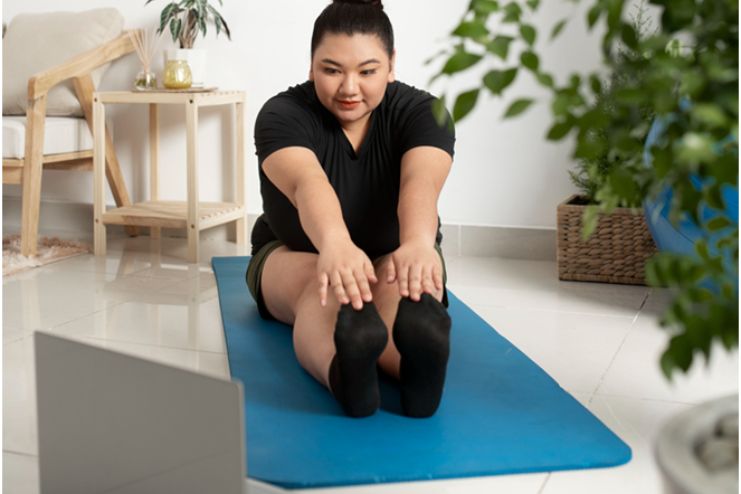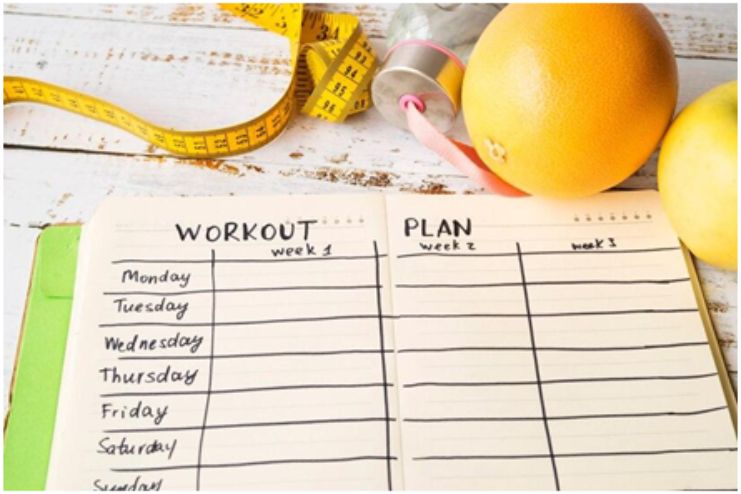AI Contribution
At HealthSpectra, we may use AI to refine grammar and structure, but every piece is shaped, checked, and approved by real people, our expert writers and editors, to ensure clarity, credibility, and care. Learn more..Affiliate Disclaimer
Some links in this article are affiliate links. We may earn a small commission if you make a purchase through these links, at no extra cost to you. We only recommend products we find useful to our readersCould exercise be something you actually look forward to? How do you make exercise a habit? The key to both questions is to discover fun ways to exercise that work specifically for you.
Making exercise a habit is one of the strongest determinants of better physical health and a better mental outlook on life. Yet, people might still think of exercise as a rather challenging thing they have to do consistently.
The secret to building a regular exercise habit may lie in discovering an approach that makes exercise enjoyable rather than a chore.
As exercise becomes a habit, some metamorphoses will occur in your body. Regular exercise tones and strengthens your muscles, improves major organ systems, and develops muscle tone and flexibility. It also reduces the symptoms of mental illnesses, as it relieves stress, anxiety, and depression.
It then becomes a source of enjoyment and brings lifelong benefits. The mental clarity and mood improvement, along with a sense of pride from successive exercises, have a positive influence on all areas of life. This is how we shall stimulate the formation of an exercise habit—a non-boring approach to it.
Read more about how to avoid exercising mistakes to prevent injuries.
Start Small and Build Consistency

Finding the motivation to exercise can be challenging. Less than 50% of the population manages to meet the aerobic guidelines established by the American Heart Association. And only 35% meet muscle-strengthening targets.
But don’t fret. Rather than getting overwhelmed with full fitness training, start with short, easy workouts. Set realistic goals, and don’t expect too much from yourself initially; just take small steps towards the actual big goal.
Even a mere ten or fifteen minutes of movement generates a considerable boost in energy levels, a reduction in stress, improved sleeping patterns, and a decrease in one’s chance of being chronically ill.
So make a brisk morning walk or evening yoga practice part of your daily routine, and eventually, you will get that permanent lifestyle with long-term health benefits.
Find Activities You Love

Building beginner fitness habits starts with choosing activities you truly love. Experiment with various workouts to discover what makes you tick and keep the excitement burning. You can engage in a number of interesting activities that go beyond the treadmill:
- Dance or Zumba
- Swimming
- Hiking or rock climbing
- Yoga
- Soccer or basketball
Each of these activities brings something new to the table: the stress relief attained through yoga, the cardiovascular benefits of swimming, and the community and engagement found in team sports.
Exercise does not feel like a chore when you enjoy it. Build a sustainable fitness routine by engaging in exciting activities.
Incorporate Variety into Your Routine
Shake up your routine so that you will not be bored and burnt out while exercising. Different forms of workouts bring different benefits to the body, ranging from basic aerobics to strength or resistance training and some mobility exercises.
In conjunction with improving general health, this variety will help retain interest and prevent the monotony that causes people to lose motivation. For example, it could take the form of running one day, trying yoga the next, and switching to strength training some other time, keeping things fresh and exciting.
This approach not only makes exercising a sustainable habit but also helps prevent overuse injuries, keeping you motivated for the long haul.
Make it Social

When you make exercising a social event, an element of fun and supportive schedule is added to your routine. Knowing that someone else is counting on you to join them for a run or a yoga class makes it easier to stay accountable.
Group fitness classes, running and cycling clubs, or simply sharing a workout with a buddy, makes regular exercise much more enjoyable and, thus, helps keep one on track.
Create A Reward System
Establishing a reward system is a great way to motivate yourself to exercise. Specific targets can be set, and you can reward yourself every time you achieve one. Positive reinforcement such as this lifts morale and encourages consistency. But be sure that rewards must match your health and fitness goals, and avoid food treats that can counter your progress.
For example, completing a weightlifting target or managing to work out a set number of times over a month means you get to treat yourself with new workout clothes, a good-quality yoga mat, or an upgraded fitness kit to reach such milestones.
You can also reward yourself with experiences like spending a day at a spa, a weekend getaway, or any fun activity you have always wanted to try: afternoon paddleboarding, a music festival, or taking a dance class.
Rewards help represent the progress you’ve made and the effort you are putting in, making you more likely to stick to your routine. Beyond tangible benefits, those accomplishments, when recognized and rewarded, create a sense of achievement that will instill confidence in the individual. This will keep the focus and enthusiasm for the fitness journey, making it easier to last in the long term.
Schedule It Like An Appointment
One of the most effective ways to prioritize exercise is to treat it like a non-negotiable appointment. Schedule your workouts in your calendar, just like an important meeting or a deadline, and then block time out for exercise so that you create a sense of accountability and commitment that makes it hard to skip or postpone.
This allows you to mentally prepare yourself to include the workouts in the routine so that they are no longer an afterthought. There is also no excuse for “being just too busy” because the time has already been set aside.
Such priority treatment reinforces the importance of exercise in your life, thus increasing the ability to stay on track. Eventually, these scheduled appointments turn into habits that support your fitness goals.
Overcome Common Barriers
Some common barriers to exercising are time, motivation, and resources.
To overcome these barriers, start by identifying small actions you can integrate into your daily routine, such as a 10-minute walk or a quick home workout. Prioritize fitness by treating it as a non-negotiable part of your day, like meals or work.
Gradually, as you build consistency, your routine will expand naturally. Additionally, find activities you enjoy, such as dancing, yoga, or cycling, to stay motivated. To stay active, use available resources, like free online classes or community groups. Consistency and incremental progress are key.
Track Progress and Celebrate Wins

Tracking your progress is a powerful way to stay motivated and see the results of your efforts. Acknowledging even small wins reinforces the positive habits you are building and helps you stay focused on your goals.
Simple tools like fitness apps or a workout journal can be incredibly powerful in monitoring your progress.
These tools allow you to log workouts, track improvements, and set milestones. Whether you are following easy workout plans or more advanced routines, seeing your growth over time—whether it is increased strength, better endurance, or consistency—provides a sense of accomplishment and keeps you motivated to continue.
Conclusion
The most important aspect of developing an exercise habit is consistency, not intensity. While you might push yourself to the limit once or twice a week, most other days, just focus on showing up and moving.
Enjoy the process, and think about how invigorating moving can be, not how close you can come to perfection in all things.
Whatever your routine looks like, enjoy it, whether it is dancing, walking, or yoga. By following some of the tips outlined in this article, we hope you will enjoy working out, stay committed, and make exercise something you look forward to, leading to lasting physical and mental benefits.
References
- https://www.heart.org/en/healthy-living/fitness/staying-motivated/make-exercise-a-habit
- https://www.cdc.gov/mmwr/volumes/72/wr/mm7204a1.htm?s_cid=mm7204a1_w
- https://www.motherzyoga.com/blog/how-to-make-exercise-a-habit
- https://www.bulletproof.com/lifestyle-articles/fun-ways-to-exercise/
- https://www.nbcnews.com/better/health/6-mental-tricks-tricks-help-make-exercise-habit-ncna914386
- https://www.webmd.com/women/exercise-habits
- https://www.helpguide.org/wellness/fitness/how-to-start-exercising-and-stick-to-it
- https://jamesclear.com/exercise-habit
- https://www.carbonworldhealth.com/blog/how-to-make-physical-fitness-a-lifelong-habit
In this Article




















